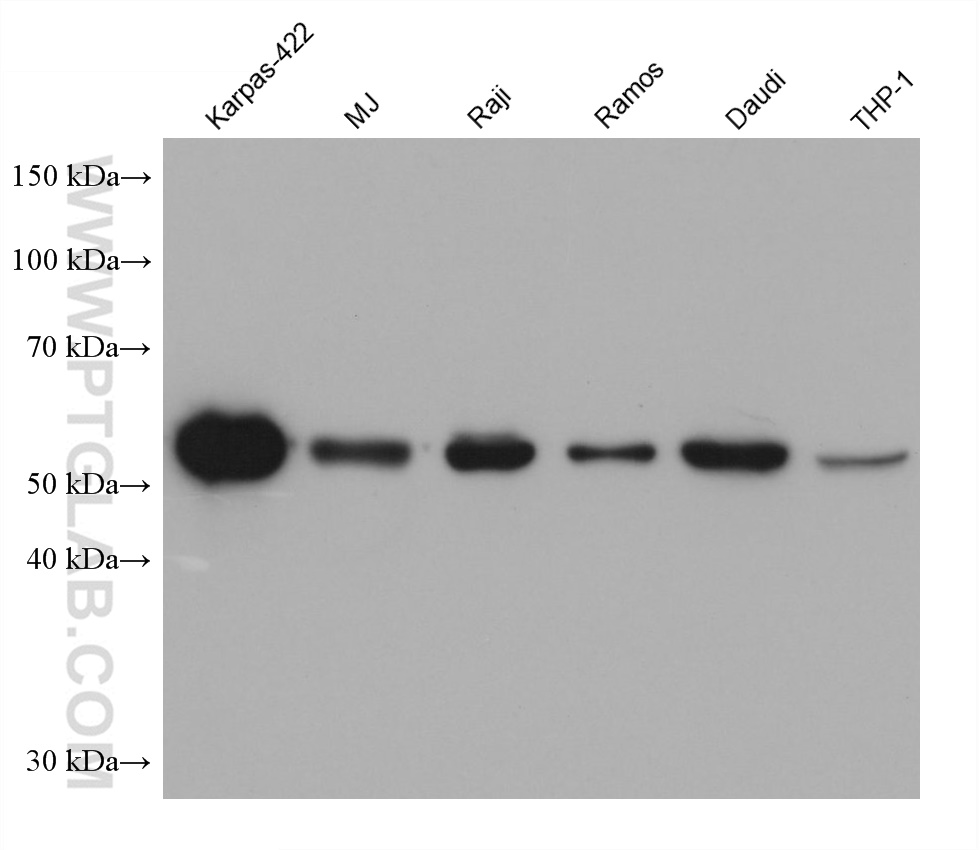验证数据展示
经过测试的应用
| Positive WB detected in | Karpas-422 cells, MJ cells, Raji cells, Ramos cells, Daudi cells, THP-1 cells |
推荐稀释比
| 应用 | 推荐稀释比 |
|---|---|
| Western Blot (WB) | WB : 1:5000-1:50000 |
| It is recommended that this reagent should be titrated in each testing system to obtain optimal results. | |
| Sample-dependent, Check data in validation data gallery. | |
产品信息
68847-1-Ig targets ZC3H12D in WB, ELISA applications and shows reactivity with human samples.
| 经测试应用 | WB, ELISA Application Description |
| 经测试反应性 | human |
| 免疫原 | ZC3H12D fusion protein Ag21770 种属同源性预测 |
| 宿主/亚型 | Mouse / IgG2b |
| 抗体类别 | Monoclonal |
| 产品类型 | Antibody |
| 全称 | zinc finger CCCH-type containing 12D |
| 别名 | MCP-induced protein 4, MCP induced protein 4, FLJ46041, EC:3.1.-.-, C6orf95 |
| 计算分子量 | 527 aa, 58 kDa |
| 观测分子量 | 52 kDa |
| GenBank蛋白编号 | BC157832 |
| 基因名称 | ZC3H12D |
| Gene ID (NCBI) | 340152 |
| RRID | AB_3670440 |
| 偶联类型 | Unconjugated |
| 形式 | Liquid |
| 纯化方式 | Protein A purification |
| UNIPROT ID | A2A288 |
| 储存缓冲液 | PBS with 0.02% sodium azide and 50% glycerol , pH 7.3 |
| 储存条件 | Store at -20°C. Stable for one year after shipment. Aliquoting is unnecessary for -20oC storage. |
背景介绍
ZC3H12D, also named as MCP induced protein 4, is a 527 amino acid protein, which contains one C3H1-type zinc finger and belongs to the ZC3H12 family. ZC3H12D exists as three isoforms and localizes in the cytoplasm. ZC3H12D may regulate cell growth likely by suppressing RB1 phosphorylation and serves as a tumor suppressor in certain leukemia cells. ZC3H12D is expressed in normal human lymphocytes but defective in some leukemia/lymphoma cell lines.
实验方案
| Product Specific Protocols | |
|---|---|
| WB protocol for ZC3H12D antibody 68847-1-Ig | Download protocol |
| Standard Protocols | |
|---|---|
| Click here to view our Standard Protocols |
